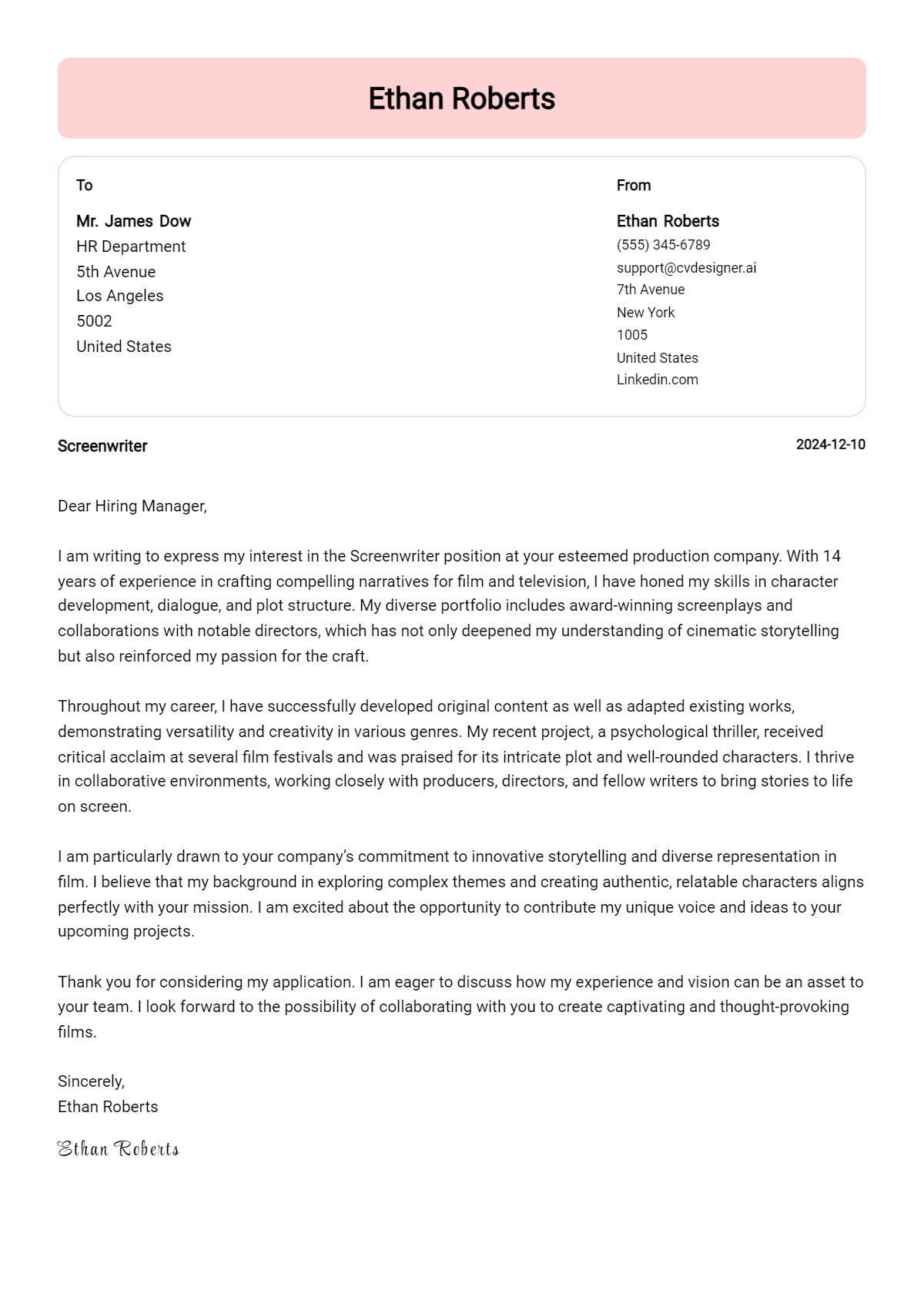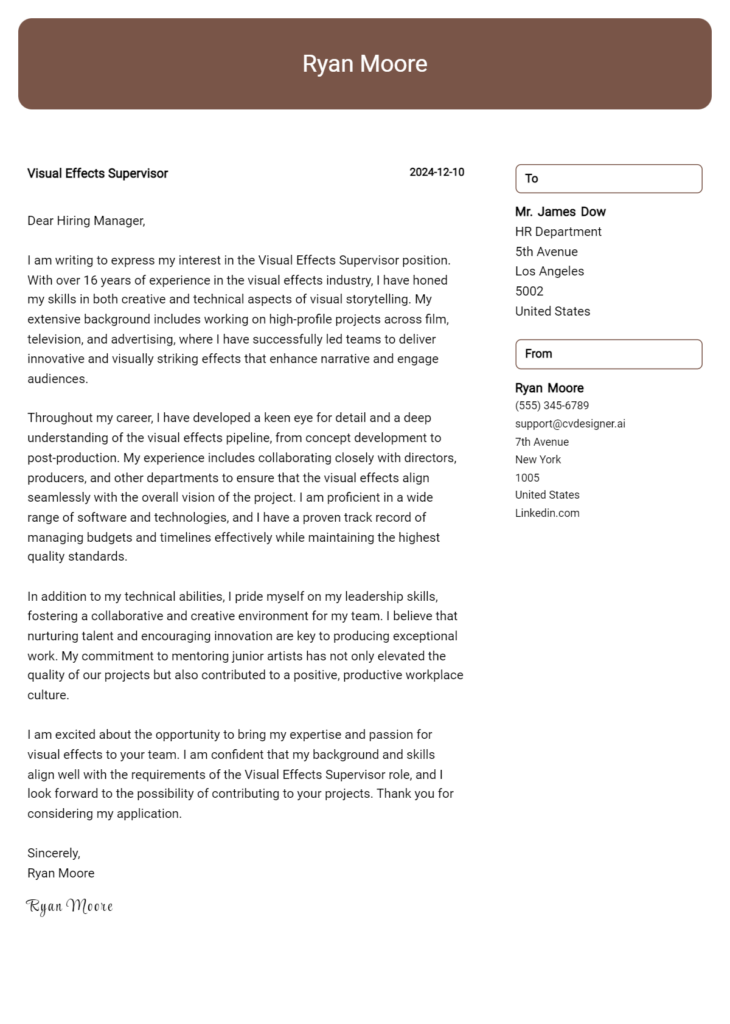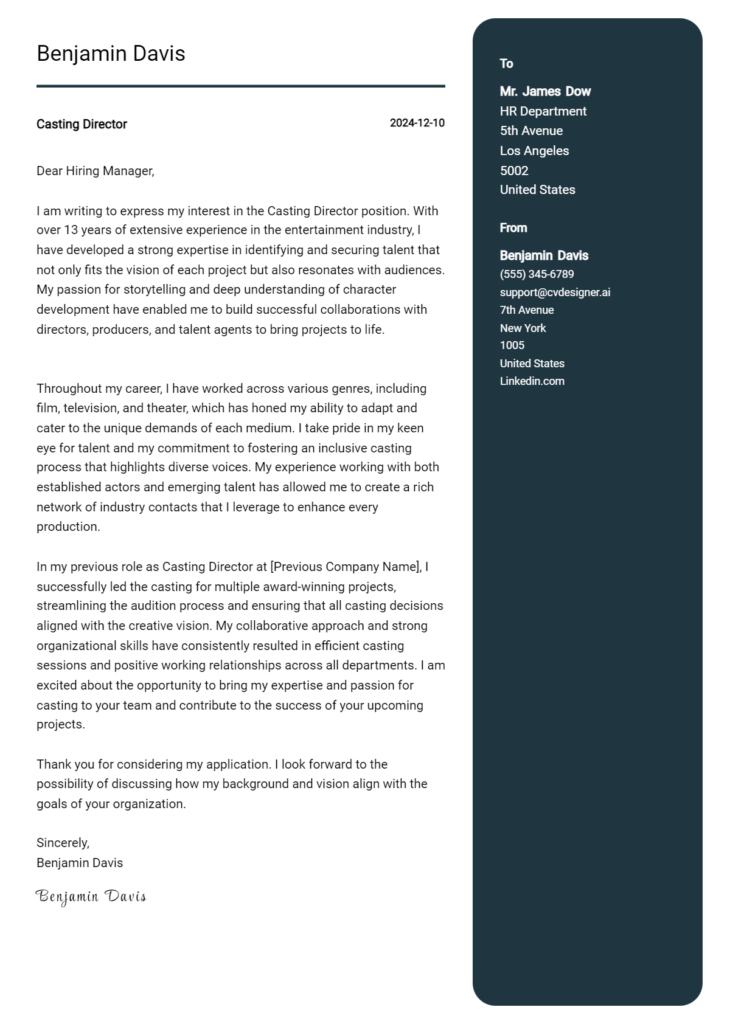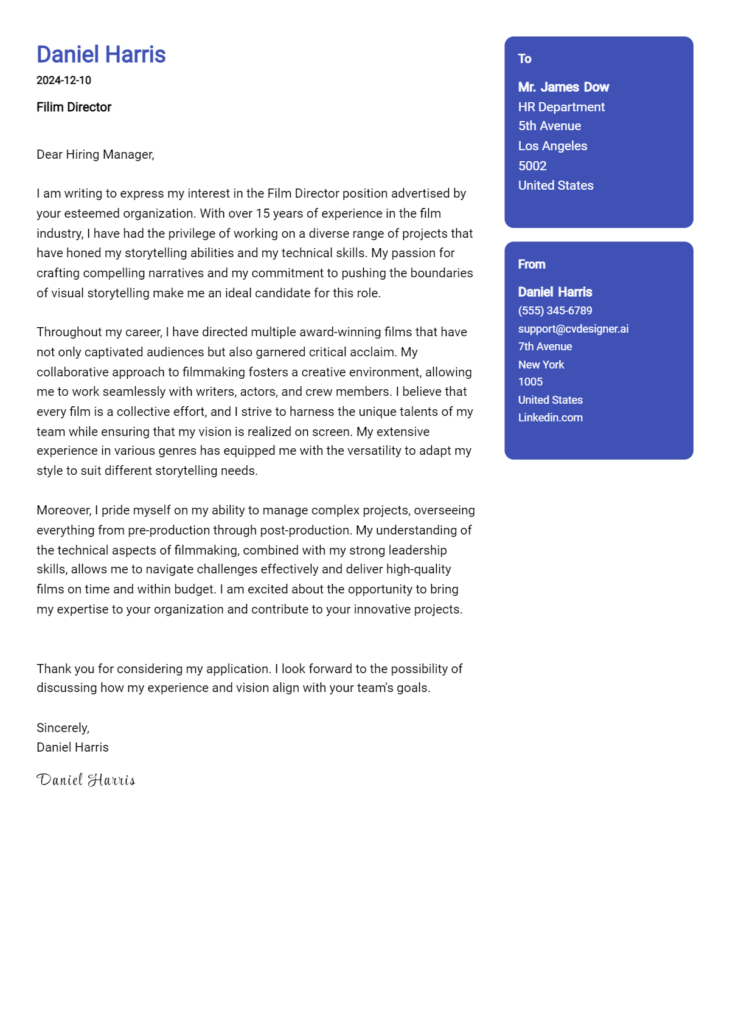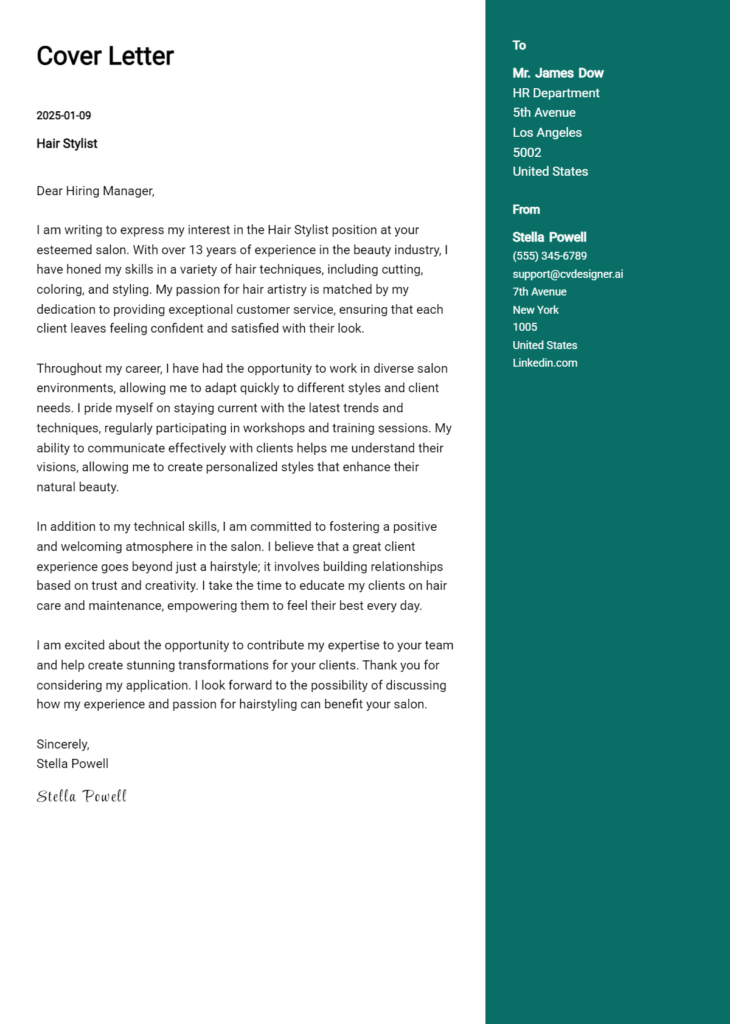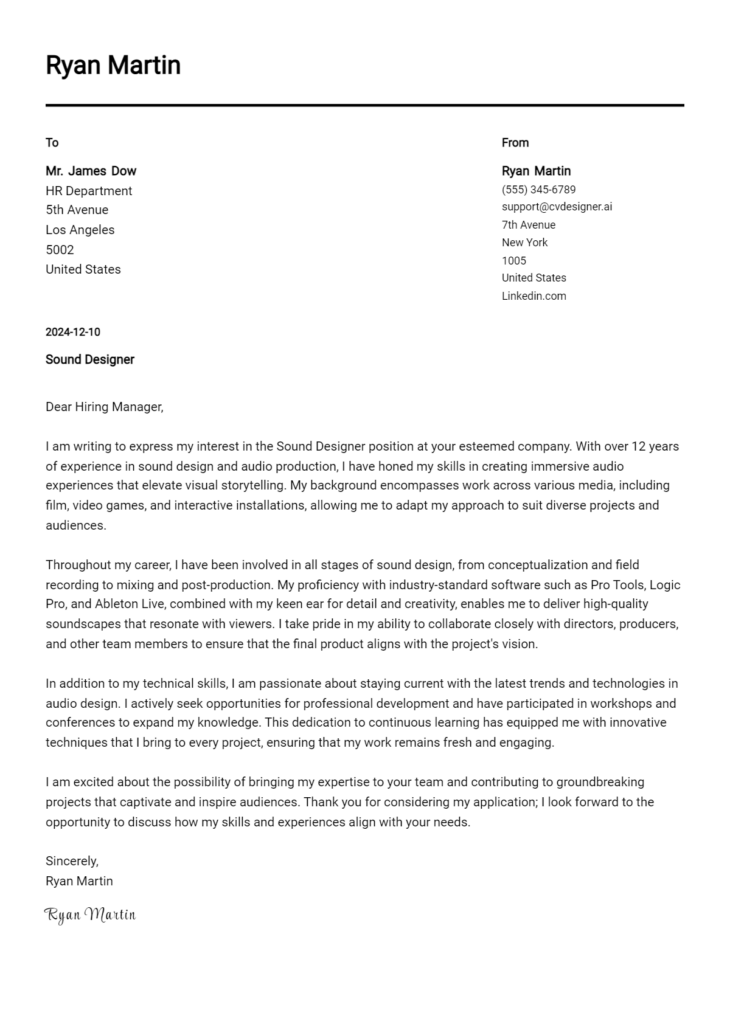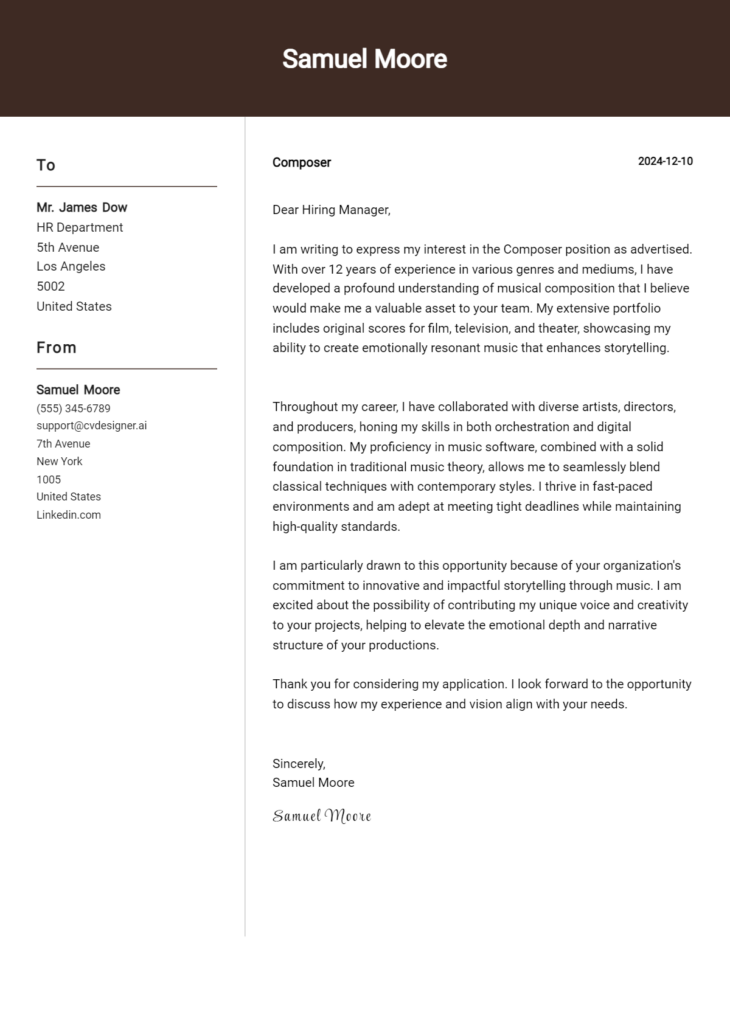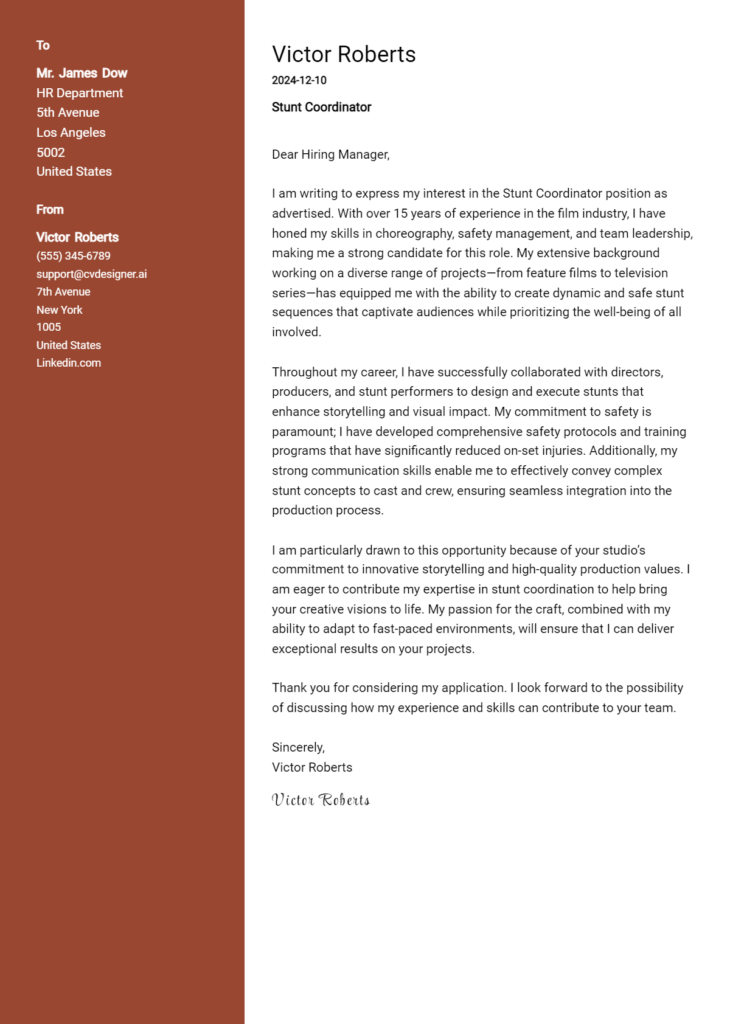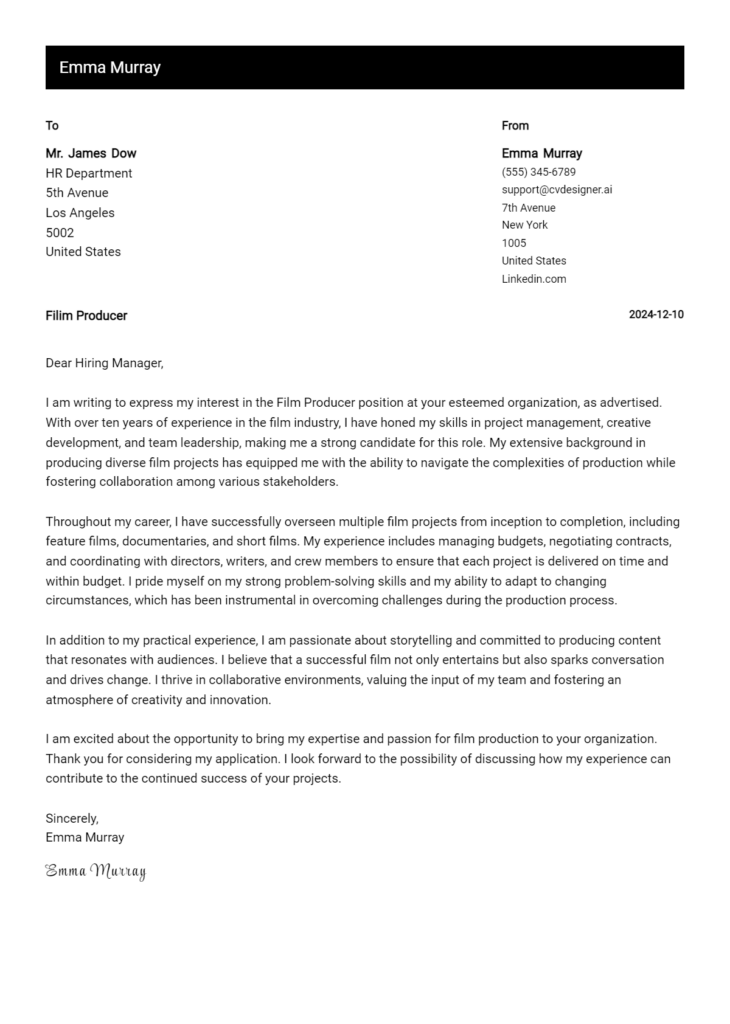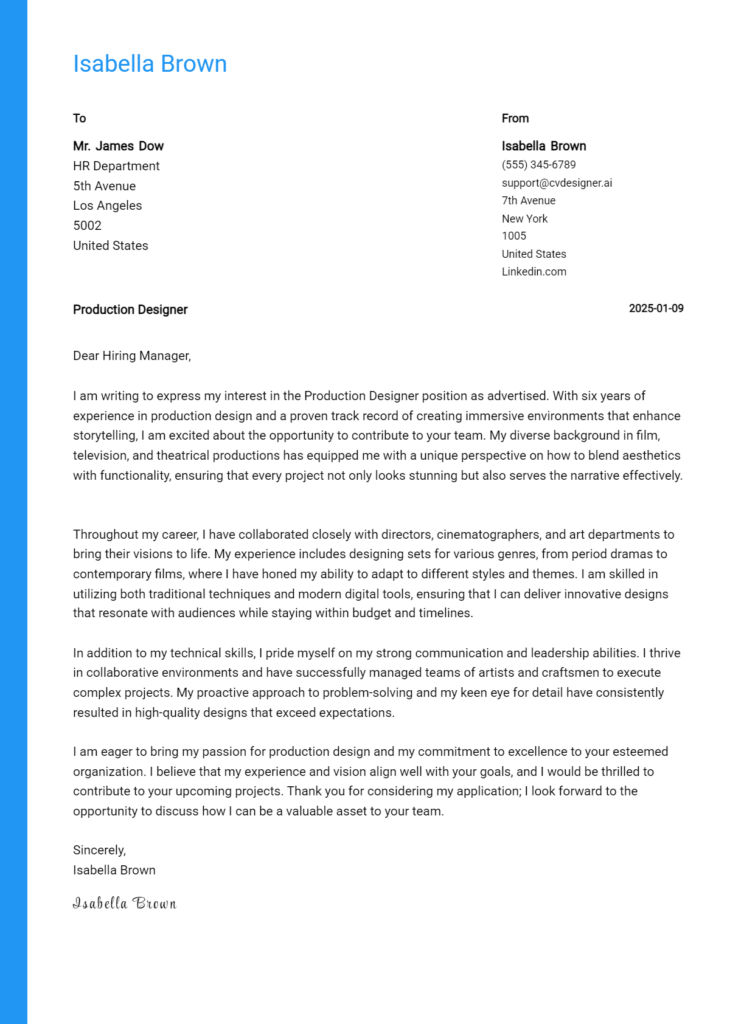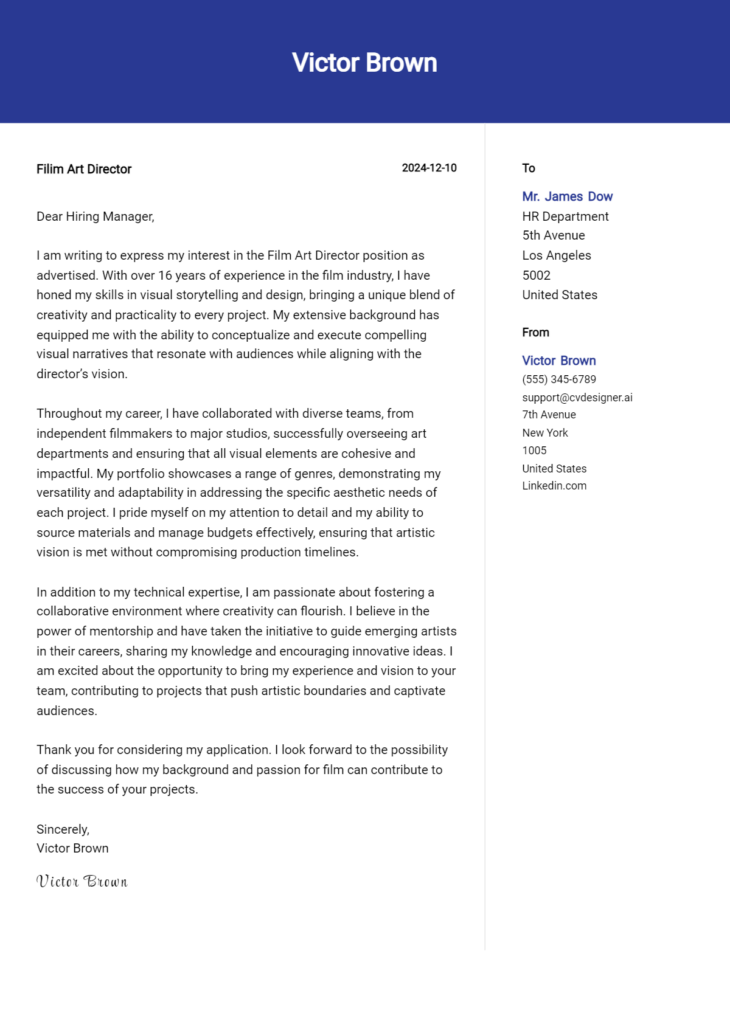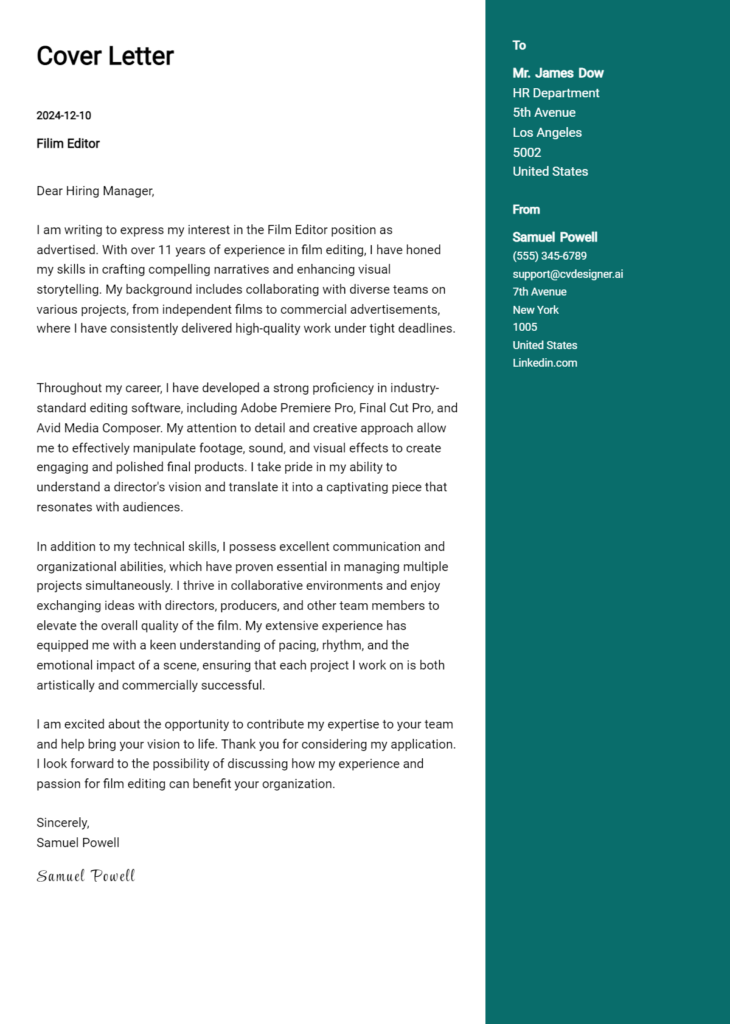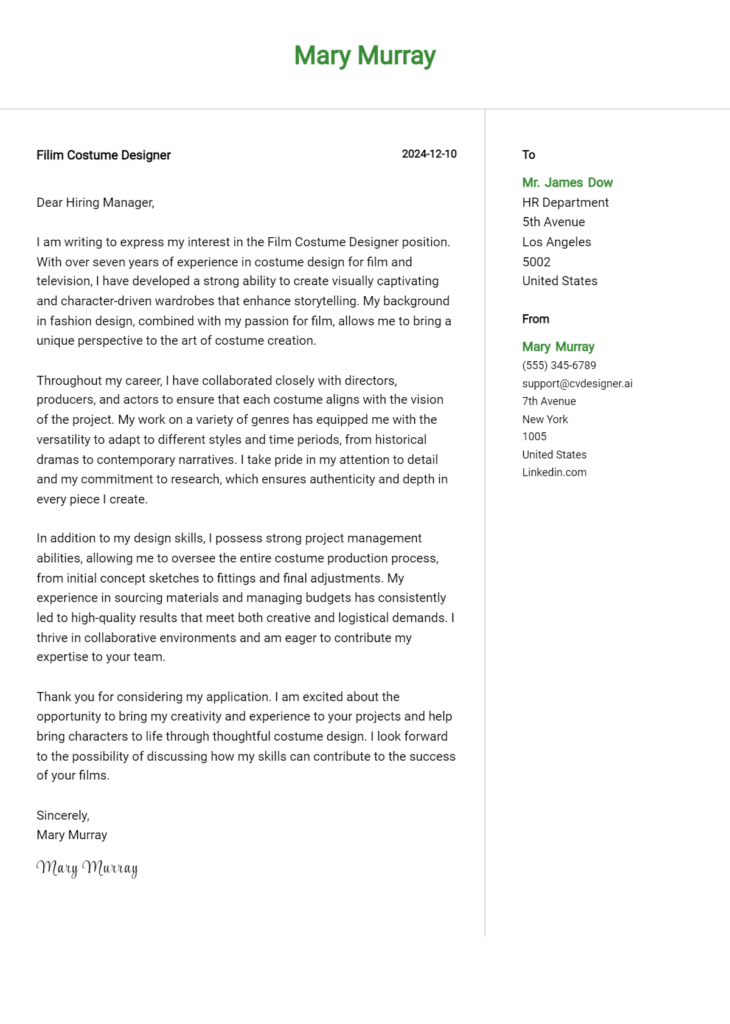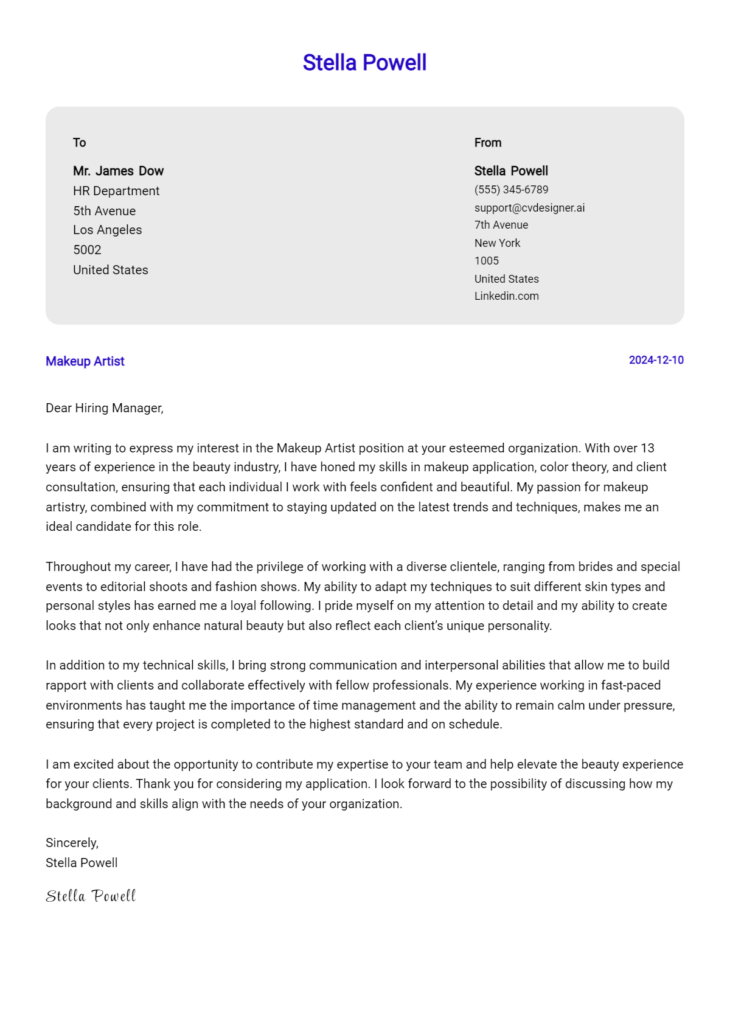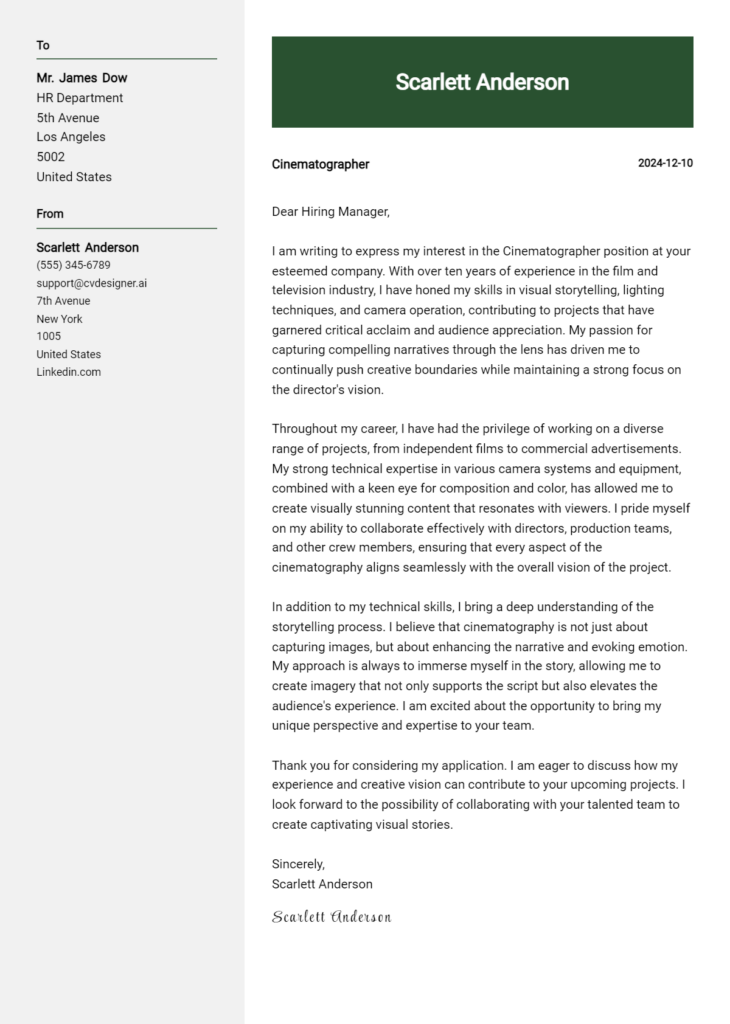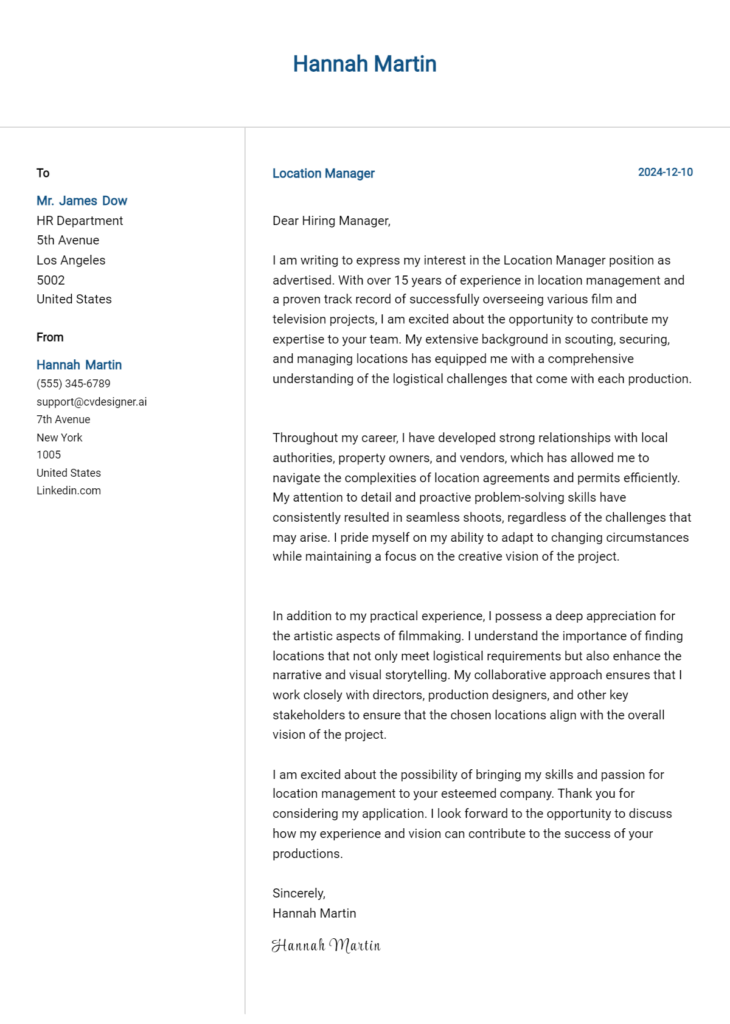Screenwriter Cover Letter Examples
Explore additional Screenwriter cover letter samples and guides and see what works for your level of experience or role.
How to Format a Screenwriter Cover Letter?
Crafting a compelling cover letter is essential for screenwriters, as it serves as your first impression on potential employers in the competitive world of film and television. Just as a well-structured screenplay draws the audience in, an effectively formatted cover letter captivates hiring managers by showcasing your storytelling abilities and creativity. The way you present your ideas not only reflects your writing skills but also your understanding of the industry and your professionalism.
In this guide, we will explore how to structure your cover letter, providing insights and screenwriter-specific examples to help you create an engaging document.
We’ll focus on the essential components of a professional cover letter, including:
- Cover Letter Header,
- Cover Letter Greeting,
- Cover Letter Introduction,
- Cover Letter Body,
- Cover Letter Closing.
Each section is crucial in emphasizing your unique voice and qualifications. Let’s break down each part and discover how to make your screenwriter cover letter truly stand out.
Importance of the Cover Letter Header for a Screenwriter
The header of a cover letter is crucial for establishing professionalism and clarity. It serves as the first impression of your application, setting the tone for the rest of the correspondence. A well-structured header should include your contact information, the date, and the recipient's details. This information not only helps the recipient identify your application easily but also conveys your attention to detail and respect for professional standards. A clear and organized header reflects your ability to communicate effectively—an essential skill for a screenwriter.
Strong Example
John Doe 123 Script Lane Los Angeles, CA 90001 (123) 456-7890 john.doe@email.com October 1, 2023 Jane Smith Creative Director XYZ Productions 456 Film Blvd Los Angeles, CA 90002
Weak Example
Hey there, This is John. 10/1/23 To whom it may concern,
The Importance of a Cover Letter Greeting for Screenwriters
The greeting of a cover letter is more than just a formality; it sets the tone for the entire document and establishes a connection with the reader. A well-crafted greeting demonstrates professionalism and shows that you have taken the time to personalize your application. By addressing the hiring manager directly, you create a sense of engagement and respect that can make a lasting impression. To avoid generic greetings that may come off as impersonal, take the time to research the recipient's name and title when possible. A personalized touch can make your cover letter stand out in a competitive field.
Here are examples of strong and weak greetings for a Screenwriter cover letter:
Strong Greeting Example
Dear Ms. Johnson,
Weak Greeting Example
To Whom It May Concern,
The Importance of a Well-Crafted Cover Letter Introduction for a Screenwriter
A well-crafted cover letter introduction is crucial for a screenwriter seeking to make a lasting impression on a hiring manager. This initial paragraph serves as the first point of contact and sets the tone for the rest of the application. It should not only grab the reader's attention but also convey a genuine interest in the role while briefly highlighting key skills or notable achievements. A compelling introduction can distinguish a candidate from others, showcasing their unique voice and perspective—essential qualities for any successful screenwriter. Below are examples of strong and weak cover letter introductions to illustrate this point.
Strong Example
Dear [Hiring Manager's Name], As a passionate storyteller with over five years of experience crafting screenplays that resonate with audiences, I was thrilled to discover the opening for a Screenwriter at [Company Name]. My recent work on [Title of Project], which won the [Specific Award or Recognition], not only honed my skills in character development and dialogue but also deepened my understanding of what captivates viewers. I am eager to bring my creativity and dedication to your team, contributing to projects that inspire and entertain.
Weak Example
Hi, I saw your job listing for a Screenwriter, and I think I can do it. I have written some scripts and have a few ideas. I really like movies and think I would be a good fit for your company.
Purpose of the Cover Letter Body for a Screenwriter
The cover letter body for a screenwriter serves as a critical platform to articulate the candidate's unique voice, skills, and narrative style, effectively showcasing their suitability for the role. It allows the writer to highlight specific projects or accomplishments that not only demonstrate their prowess in storytelling but also their ability to connect with audiences and collaborate within a team. By sharing relevant experiences, such as successful scripts, awards, or collaborations with notable directors, the cover letter becomes a persuasive argument for why the candidate would be a valuable addition to the company.
Strong Example
Dear [Hiring Manager's Name], I am excited to apply for the screenwriter position at [Company Name]. With a Master's degree in Film and over five years of experience crafting compelling narratives for both television and film, I have honed my skills in creating engaging characters and intricate plots. My recent project, "Lost in the City," which aired on [Network Name], garnered a nomination for Best Original Screenplay at the [Film Festival Name], showcasing my ability to resonate with audiences. I am particularly drawn to [Company Name] because of your commitment to innovative storytelling and I believe my unique voice and proven track record of collaboration will bring value to your team. Best regards, [Your Name]
Weak Example
To Whom It May Concern, I want to apply for the screenwriter job at your company because I like movies. I have written some scripts, but none of them have been produced. I think I can help your team because I have ideas. I hope you consider my application. Sincerely, [Your Name]
Importance of the Cover Letter Closing for a Screenwriter
The closing paragraph of a cover letter is crucial for leaving a lasting impression on potential employers. It serves to summarize your qualifications succinctly, reiterate your enthusiasm for the role, and encourage the hiring manager to take the next steps, such as reviewing your resume or scheduling an interview. A strong closing can reinforce your fit for the position and inspire confidence in your abilities, while a weak closing can diminish the impact of the preceding content. Below are examples of both effective and ineffective closings.
Strong Example
Thank you for considering my application for the screenwriter position. With my extensive experience in crafting compelling narratives and my passion for storytelling, I am excited about the opportunity to contribute to your team. I believe my unique perspective and dedication to the craft align perfectly with your vision. I look forward to the possibility of discussing how I can bring my skills to your projects. Please feel free to review my resume for further details, and I hope to schedule an interview soon.
Weak Example
I hope you like my application. I’ve attached my resume, so you can look at it if you want. I’m not sure when I can talk, but I guess we can figure something out. Thanks for your time.
These tips will guide aspiring screenwriters in crafting an effective cover letter that stands out in a competitive industry. A well-written cover letter is crucial for showcasing not only your technical skills in writing and storytelling but also your problem-solving abilities, knowledge of the Screenplay Development Life Cycle (SDLC), capacity for teamwork, and a genuine passion for continuous learning. By emphasizing these qualities, you can articulate why you are the ideal candidate for the role.
Tips for Crafting an Effective Screenwriter Cover Letter
Highlight Your Technical Skills: Clearly articulate your proficiency in screenwriting software (like Final Draft or Celtx) and your understanding of screenplay structure. Provide specific examples of projects where you successfully applied these skills. This demonstrates your readiness to hit the ground running in a professional setting.
Showcase Problem-Solving Abilities: Discuss instances where you faced challenges during the writing process or in collaboration with others and how you creatively resolved them. This could include overcoming narrative roadblocks or addressing feedback from producers or directors. This not only showcases your resilience but also your adaptability in a collaborative environment.
Demonstrate SDLC Knowledge: Familiarize yourself with the stages of screenplay development and mention your experience in each phase—from concept creation to revisions. This knowledge reflects your understanding of the industry standards and your ability to navigate the complexities of the writing process effectively.
Emphasize Teamwork: Collaborating with directors, producers, and fellow writers is crucial in screenwriting. Provide examples of successful collaborations and how you contributed to team dynamics. Mention any relevant experiences in writers' rooms or workshops that highlight your ability to work well with others.
Express a Passion for Continuous Learning: The film industry is always evolving, and so should your skills. Mention any recent workshops, courses, or self-directed learning initiatives you've undertaken to enhance your craft. This commitment to growth signals to employers that you are proactive and dedicated to becoming a better writer.
For additional inspiration, consider exploring cover letter templates or utilizing a cover letter builder to create a polished and professional document that reflects your personality and expertise.
Common Mistakes to Avoid in a Screenwriter Cover Letter
Crafting a compelling cover letter is crucial for screenwriters aiming to stand out in a competitive industry. Avoiding common pitfalls can significantly enhance your chances of catching a hiring manager's attention. Here are some frequent mistakes to watch out for:
Generic Content: Many writers use a one-size-fits-all approach. Tailor your letter to the specific job and company to show genuine interest.
Overly Long Letters: A cover letter should be concise. Aim for a length of one page and focus on the most relevant experiences.
Neglecting Formatting: A cluttered or unprofessional layout can detract from your message. Refer to cover letter format guidelines to ensure clarity and professionalism.
Lack of Specificity: Failing to mention specific projects or experiences can make your letter forgettable. Highlight relevant screenwriting achievements that align with the job.
Ignoring the Audience: Not considering who will read your letter can lead to a disconnect. Research the company and its projects to tailor your tone and content appropriately.
Spelling and Grammar Errors: Typos can make you seem careless. Always proofread, or better yet, have someone else review your letter before submission.
Forgetting a Call to Action: Conclude your letter without a clear next step or invitation for further discussion. A strong closing can encourage the reader to reach out.
By steering clear of these common mistakes and checking out cover letter examples for inspiration, you can create a powerful cover letter that showcases your unique voice and skills as a screenwriter.
Cover Letter FAQs for Screenwriter
What should I include in my cover letter as a screenwriter?
In your cover letter, start by introducing yourself and mentioning the specific project or position you're applying for. Highlight your relevant experience, such as previous screenwriting credits, awards, or standout projects. Emphasize any unique skills or perspectives that make you a strong candidate, such as genre expertise or knowledge of the industry. Additionally, mention your passion for storytelling and how it aligns with the vision of the production company or studio. Finally, conclude with a call to action, expressing your desire for a meeting or further discussion about your work.
How long should my cover letter be?
A cover letter for a screenwriting position should typically be one page long, consisting of three to four concise paragraphs. Aim for around 250-300 words. Focus on being clear and engaging, as industry professionals often have limited time to review submissions. Each paragraph should serve a purpose: an introduction, a summary of your qualifications, a demonstration of your passion for the project, and a closing statement. Avoid lengthy explanations; instead, make every word count to showcase your skills and enthusiasm.
Should I include writing samples with my cover letter?
Yes, you should include writing samples with your cover letter, but ensure they are relevant to the position or project you're applying for. Typically, a few pages from your screenplay or a link to an online portfolio is appropriate. Mention these samples in your cover letter, highlighting the specific elements that align with the job or company's focus. Make sure your samples are polished and representative of your best work, as this is your opportunity to demonstrate your unique voice and storytelling ability.
How can I tailor my cover letter for different projects?
To tailor your cover letter for different projects, research each company or production team to understand their style, tone, and recent projects. Address your letter to a specific individual if possible, and mention the project by name. Align your experiences and skills with the company’s objectives, emphasizing how your vision fits their brand. Additionally, reference any relevant genres or themes that resonate with their past work. This demonstrates your genuine interest and shows that you’re not sending a generic letter, which can significantly increase your chances of standing out.
Build your Cover Letter in minutes
Use an AI-powered cover letter builder and have your letter done in 5 minutes. Just select your template and our software will guide you through the process.

